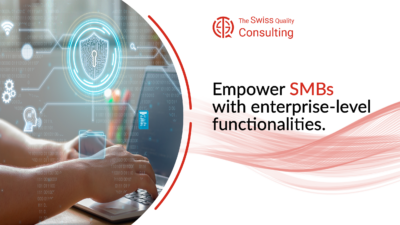Leveling the Playing Field: Empowering SMBs with Enterprise-Level Functionalities to Bring Advanced Enterprise Solutions to Small and Medium Businesses
Introduction
In an increasingly competitive business landscape, empowering SMBs (Small and Medium-Sized Businesses) with enterprise-level functionalities is becoming vital for their growth and sustainability. This article aims to provide business executives, mid-level managers, and entrepreneurs with insights into how incorporating enterprise-grade tools and technologies can revolutionize the way SMBs operate and compete.
The Importance of Enterprise-Level Functionalities for SMBs
Enterprise-level functionalities, once the exclusive domain of large corporations, have transcended the boundaries of size and complexity, becoming increasingly accessible to small and medium-sized businesses (SMBs). These advanced capabilities, often perceived as the hallmark of large-scale operations, now empower SMBs to level the playing field, streamline operations, harness data insights, and gain a competitive edge in today’s dynamic marketplace.
At the heart of this transformation lies the democratization of technology. Cloud-based solutions, coupled with advancements in artificial intelligence (AI), machine learning (ML), and data analytics, have brought enterprise-grade capabilities within reach of SMBs. These advancements have blurred the lines between large corporations and smaller businesses, allowing SMBs to adopt sophisticated tools and technologies that were once considered prohibitively expensive or complex.
Enterprise-level functionalities encompass a wide spectrum of capabilities, including:
Advanced Technology Systems: SMBs can now leverage cloud-based infrastructure, high-performance computing, and cutting-edge networking solutions, enabling them to process large volumes of data, support complex applications, and maintain a resilient and scalable IT environment.
Comprehensive Data Analytics: SMBs can harness the power of data analytics to gain real-time insights into customer behavior, market trends, and operational performance. These insights enable data-driven decision-making, optimizing marketing campaigns, improving product development, and enhancing customer satisfaction.
Sophisticated Management Tools: SMBs can adopt enterprise-grade project management, customer relationship management (CRM), and enterprise resource planning (ERP) systems to streamline operations, automate processes, and improve collaboration across departments.
Enhanced Security and Compliance: SMBs can implement robust cybersecurity measures, data encryption, and access control protocols to protect sensitive information, comply with industry regulations, and safeguard their reputation.
The adoption of enterprise-level functionalities provides SMBs with a multitude of benefits, including:
Improved Operational Efficiency: SMBs can automate tasks, streamline processes, and optimize resource allocation, leading to increased productivity, reduced costs, and improved overall efficiency.
Data-Driven Decision-Making: SMBs can leverage data insights to gain a deeper understanding of their customers, market dynamics, and operational performance, enabling informed decisions that drive strategic growth.
Enhanced Competitive Edge: SMBs can differentiate themselves from competitors by adopting innovative technologies, providing personalized customer experiences, and making data-driven decisions that optimize their operations.
Increased Agility and Scalability: SMBs can adapt to changing market conditions, expand their operations, and accommodate new business models with the flexibility and scalability of enterprise-grade solutions.
In essence, adopting enterprise-level functionalities is not merely about achieving parity with large corporations; it is about empowering SMBs to operate with the same sophistication, agility, and data-driven decision-making capabilities that have long been the hallmark of enterprise-level success. By embracing these advanced capabilities, SMBs can level the playing field, outpace their competitors, and achieve sustainable growth in today’s dynamic and interconnected business landscape.
Enhancing Operational Efficiency and Competitiveness
The integration of enterprise-level functionalities allows SMBs to streamline their processes, improve customer experiences, and compete more effectively in their markets.
Role in Change Management
Implementing enterprise-level functionalities in SMBs is a critical aspect of change management. As market dynamics evolve, SMBs must embrace advanced tools and technologies to remain agile and responsive to market changes.
Adapting to Market Changes with Advanced Tools
With enterprise-level functionalities, SMBs can more quickly adapt to changing market conditions, customer needs, and technological advancements, ensuring business resilience and adaptability.
Impact on Executive Coaching and Leadership
Effective leadership is essential for successfully integrating enterprise-level functionalities in SMBs. Executive coaching services are increasingly focusing on equipping SMB leaders with the skills to leverage these advanced tools for business growth and innovation.
Developing Strategic Vision and Technological Acumen
Through executive coaching, SMB leaders can develop the strategic vision and technological acumen necessary to effectively integrate and utilize enterprise-level functionalities.
Effective Communication in Technology Integration
Effective communication is key to the successful adoption of enterprise-level functionalities within SMBs. Leaders must clearly communicate the benefits and changes associated with these new systems to ensure team alignment and adoption.
Building a Tech-Savvy and Adaptive Team Culture
Clear and continuous communication helps in building a culture that is receptive to technological advancements and change, which is crucial for the successful integration of enterprise solutions.
Generative AI in Enhancing SMB Functionalities
Generative Artificial Intelligence (AI) is playing a significant role in empowering SMBs with enterprise-level functionalities. AI technologies can provide SMBs with powerful analytics, automation, and customer insights, previously only accessible to larger corporations.
Leveraging AI for Business Transformation
Generative AI allows SMBs to access sophisticated business intelligence and automation tools, enabling them to make more informed decisions, optimize operations, and enhance customer engagement.
Conclusion Empowering
In conclusion, empowering SMBs with enterprise-level functionalities is a game-changer, enabling these businesses to scale, innovate, and compete effectively in today’s market. By embracing enterprise-grade technologies and strategies, SMBs can unlock new growth opportunities and establish a stronger presence in their industries.
#SMBGrowth, #EnterpriseSolutions, #BusinessInnovation, #AIforSMBs, #TechEmpowerment























